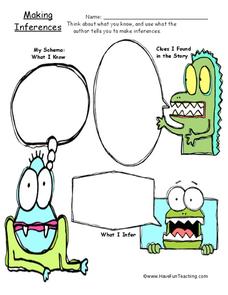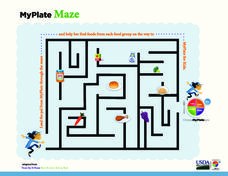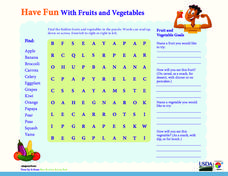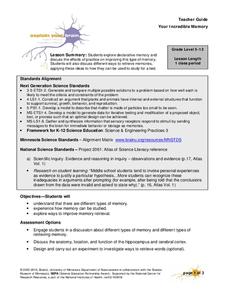iCivics
Why Government?
Why do people create governments? Where did we get our ideas about government? This is a fantastic introductory lesson for your American government class that begins by reviewing the philosophies of Thomas Hobbes and John Locke in...
iCivics
Wanted: A Just Right Government
What type of government did American colonists gain and seek after gaining their independence after the Revolutionary War? Here is instructional activity that will guide your young learners through the new nation's progression from the...
Freeology
Get to Know You - Bingo
Who has a pet fish? Bingo! Meeting classmates just got a whole lot easier with this colorful template that asks individuals to find 16 classmates who meet the criteria defined in the matrix boxes. Consider extending the activity by...
Curated OER
Author Study: Cynthia Rylant
Explore the life's work of one of the great children's authors using this ten-lesson author study unit. After first performing some whole-group research into the life of Cynthia Rylant, the class goes on to read six different...
iCivics
We the Jury
Learners take on the roles of jurors in a civil case to evaluate evidence and determine a verdict in this engaging online interactive experience.
Houghton Mifflin Harcourt
Balloons Over Broadway Activity Kit
After reading the book Balloons Over Broadway about the incredible puppeteer who created the first Macy's larger-than-life parade balloons, your youngsters will celebrate their reading by participating in a...
Federal Reserve Bank
Measuring the Great Depression
Young historians examine the cost of goods and services through the Consumer Price Index (CPI), output measured by Gross Domestic Product (GDP), and unemployment measured by the unemployment rate to gain an understanding of the economic...
Have Fun Teaching
Making Inferences (21)
Monstrous! But do not be afraid! These weird-looking creatures won't scare readers away from making inferences about what authors are trying to show, rather than tell their readers. Instead the toothy, bug-eyed aliens model the...
University of Kentucky
The Successful Person's Guide to Time Management
"If you don't know where you are going, you might end up someplace else." Yogi Berra's wise words can also be applied to time-management. In order to be successful at time-management you need to know where you are going, what you want to...
Choose My Plate
MyPlate Maze
Scholars find their way through a maze filled with food items from each food group, including grains, dairy, fruit, vegetables, and protein. They know they have made it out when they see the MyPlate dinner plate.
Choose My Plate
MyPlate Word Search
Encourage healthy eating, cooking, and goal setting with a word search that showcases a variety of fruits and vegetables, and provides a four-step plan to eat more of them.
Choose My Plate
MyPlate Secret Code
Can your scholars crack the code? Class members put on their detective cap to solve four sentences related to healthy eating, cooking, and the five major food groups by following a code comprised of images.
University of Minnesota
Your Incredible Memory
Test the efficiency of your memory! Scholars test each other's memory as they explore factors that affect memory retrieval. Through experimental analysis, they discover there are different types of memory, which has an impact on the...
University of Minnesota
Makes Me Sweat
Never let them see you sweat ... unless you can't help it! Scholars design an experiment to determine the effects of stress on the body. They monitor sweat production under different conditions and relate the response to the function of...
University of Minnesota
Mindflex Activity
Control a ball with your mind! Using a headset with an electrode, learners adjust the movement of a ball. They develop an experiment that tests the involvement of the central nervous system in controlling the ball. The activity helps to...
University of Minnesota
Manduca sexta Wax Model
Caterpillars' and moths' most obvious change is physical, but what happens to their nervous systems as they complete metamorphosis? Through a hands-on investigation, young scholars construct the nervous system of a caterpillar. They then...
Prestwick House
Understanding Language: Slant, Spin, and Bias in the News
We live in a time of fake news, alternative realities, and media bias. What could be more timely than an activity that asks class members to research how different sources report the same topic in the news?
Prestwick House
Connotative vs. Denotative Meanings
Besides the dictionary definition, words also carry the added weight of meanings that are inferred or implied, meanings conferred on words, or connotations. To gain an understanding the importance of connotation, class members...
Queen's Printer for Ontario
Composers in Music History
What do Johann Sebastian Bach and Miles Davis have in common? Much more than class members might imagine. The comparison of these two famous composers is just one lesson in a unit that investigates many facets of the music industry...
National Nanotechnology Infrastructure Network
Coffee Break with Nanoscience: Film Formation and “Coffee Rings”
Prepare scholars for micro and nanoscale investigations. A lab activity allows individuals to practice their experimental techniques while becoming to accustomed to the smaller scale of the materials. They also make decisions about the...
Prestwick House
Writing Arguments in Response to Nonfiction
Emotional appeal or argument? That is the question. An informative activity helps your class recognize the difference between a logical argument and an emotional appeal and learn how to craft an argumentative response. Writers develop a...
Newseum
E.S.C.A.P.E. Junk News
Fair, balanced, and reputable information? There's an acronym for that! Scholars learn the E.S.C.A.P.E. method for evaluating news sources. Then, pupils work in small groups to read and analyze a news story and discuss the activity to...
iCivics
Step One: We've Got Issues
What is the most pressing issue in your community? The resource helps you and your middle schoolers begin the process of doing something about it! Learners compare and contrast two pressing issues in their local counties by reading two...
Serendip
Homeostasis, Negative Feedback, and Positive Feedback
So many bodily activities depend on homeostasis! Give learners a solid background to understand the basic process of the human body. Scholars first examine negative feedback loops contributing to body temperature regulation and then a...























